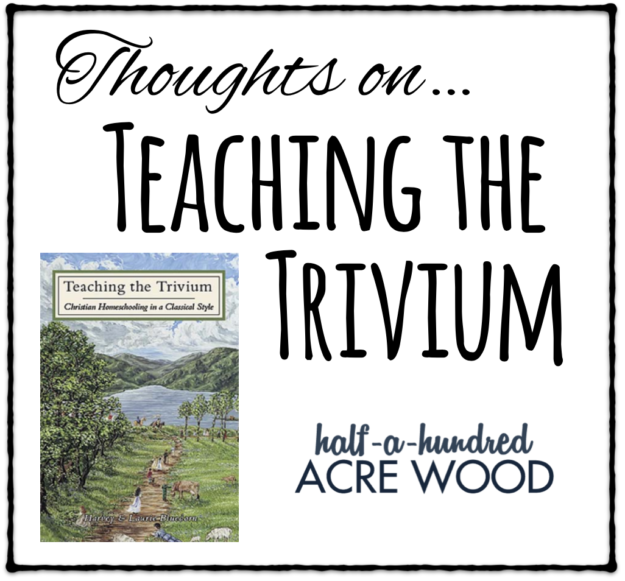As we travel across West Virginia, three boys are loudly singing “Take Me Home Country Roads” by John Denver (at the top of their lungs), the rain is pelting our windshield so hard that it sounds like a helicopter is about to take off right there in our car, and… I’m trying to shout over the noise to my husband about the profound thoughts crossing my mind as I read Teaching the Trivium beside him in the passenger seat. For some reason, he just doesn’t seem to be comprehending anything I’m saying.
All I can say is… my poor husband.
Because I didn’t finish it beforehand, I ended up reading a couple hundred pages of Teaching the Trivium while on our big road trip and finally finished reading it while in Washington, DC, of all places, pondering such things as…
Redeeming the time, because the days are evil. Ephesians 5:16
Walk in wisdom toward them that are without, redeeming the time. Colossians 4:5
The days are evil and they will consume our time. We can easily waste our time pursuing an outsider’s agenda. We need to apply wisdom in order to buy back some of that time for the Lord’s use. –Teaching the Trivium, p. 115
This book gave me so much to think about – I’m still chewing upon it a thousand miles away from the place where I finished it. What about you? Have you read this book? What’s your favorite part? What’s your least favorite part?

For those who haven’t read it yet
Teaching the Trivium by Harvey & Laurie Bluedorn starts out with some general arguments for homeschooling and classical education while providing a Biblical vision for homeschooling. The Bluedorns thoroughly explain what is meant by the trivium and provide a compelling case for a classical Christian education. They also provide an in-depth look at teaching the classical languages, logic, and rhetoric, and give guidance on the selection of literature in a classical Christian homeschool setting. If you are new to homeschooling or interested in learning more about a classical education, this book gives thorough answers to many of the questions you may have.
This book is rather large – over 600 pages, but the appendix, which contains many resources and articles related to homeschooling, accounts for nearly 200 pages. This is a book I will likely refer to over and over again.
My two cents and random thoughts
It was encouraging to find that the Bluedorns highlighted the “Different Methods and Approaches to Homeschooling in Light of the Trivium,” since many people think that a classical education means you just focus on rote memorization. On the other hand, classical educators can often look down on others for incorporating unit studies or experiential learning. However, classical education is an educational model that may be pursued with various approaches. We all use different tools as we educate our children. I personally know classical educators who use a Montessori approach, others who love unit studies, and even more who tend towards a Charlotte Mason approach (who was a classical educator herself…. and “living books” are very much a part of classical education). The whole thing boils down to, “each method and approach has its place.” It was a relief to read from more experienced classical educators that our natural bent is an acceptable tool for classical learning.
My favorite part of the whole book was the The Practical Trivium, which contained anecdotes while providing a suggested course of study for each of the levels of the trivium. The “Early Knowledge Level (Ten Things to Do Before Age Ten)” & “Later Knowledge Level (Ten Things to Do with Children Ages Ten through Twelve)” chapters were the two chapters that applied most to our home, but the Understanding and Wisdom Level chapters provided quite a bit of insight. You can read the article “Ten Things to Do before Age Ten” on the Bluedorn’s website TriviumPursuit. Matter of fact, you can read several excerpts from their free articles page (start with those listed under Articles for Beginners).
The nitty gritty
“It is our observation that former school teachers usually have the greatest difficulty adjusting to Homeschooling – by their own admission. What they’ve been taught doesn’t match reality.” – Teaching the Trivium, p. 67
By my own admission, this was correct. (For those who might not know, my former careers and degrees were in engineering and education.) Of all the subjects I teach, math is the most difficult for me to steer clear of the textbook mentality. I am still trying to rid myself of “the latest methods of educational psychology.”
Included in the appendix is an interesting article about math and how formal math instruction should not be pursued until the later knowledge level (age 10 or so). The argument is that when they are developmentally ready, a child can learn 5 years of math in just a couple of months. But other classical educators argue that math should be taught from an early age. Nevertheless… I have been thinking a lot about this. To be honest, my children do not enjoy math much at all, and it is so difficult for someone who goes loopy-excited over mathematical thoughts and activities. And I’m thinking… is it possible…? Maybe I have been too strict about math…? Should I stick with Life of Fred and board/card games and real-life application of math instead of pursuing the textbooks at this stage? I’ve been driven to teach them the discipline of math, but, in doing so, have I stifled their love of learning? Those are the types of thoughts I’m still chewing upon…
The other thing I’m struggling with is learning the classical languages. Language is so difficult for me. I mean, I can hardly even use my native tongue of English correctly! What to do about Latin? And GREEK?!? And HEBREW?!? Not to mention all the other languages my children could be learning.
Yes, I’ve got to come to terms with this. I absolutely want to teach my children some other languages while they are young and can absorb it so well. But, rather, I sit paralyzed and avoid doing anything in the language arena aside from some Latin Noun and Verb Endings practice and singing John 1 in Latin, which my mind tells me just isn’t enough (but my motivation tells me it will suffice). After visiting Jefferson’s Monticello… I just know I should be exposing my children to other languages. Dora the Explorer just doesn’t cut it. (NOTE TO SELF: Not only buy Latin curriculum but also go ahead and use it, too.)
There exists so much within this book, but I will close with a few freeing thoughts:
- To prepare my children for the Logic stage, I can simply play board games that teach them early logic skills. (Now this I can do!)
- My children do not need organized crafts and projects to do throughout our school year. Give them Play-doh, construction paper, and other craft supplies and let them use their imaginations. I have already seen how valuable this approach is!
- Before age ten, focus on vocabulary. It is a major indicator of intelligence. (Have you ever tried reading the Declaration of Independence? At the time of its writing, a plain-old common person of much younger age could read and comprehend it. They knew what the subjects and verbs and clauses were. I’ve finally gotten to where I think I understand it. I’m not sure I can diagram it yet, though. Nothing like a trip through our Founding Fathers’ history to help me recognize how little I know and understand.)
- “Our goal [at the grammar stage] is to develop competence in the tools of inquiry: reading, listening, writing, observing, measuring.” Teaching the Trivium, p. 101. This single thought is one I’ve been trying to wrap my mind around for months now. And it has been transforming how we approach our school days. We’re still figuring it out, but we’re developing a more intentional literature-rich environment and using a tool (our classical notebook) for recording our observations, writing about them, and improving our listening skills. It is so simple and so deep and so rewarding all at the same time!
Regardless of its length, Teaching the Trivium is a valuable read for homeschool parents and contains many nuggets of grace and wisdom to assist us in the journey ahead! If you’d like to take a sneak peek at some of the great things within this book, here are some chapters that also stand alone as great articles to reference.
- The Trivium in a Capsule
- Building a Firm Foundation for Classical Education: Ten Things to Do Before Age Ten
- The Grammar Level: Ten Things to Do From Ages 10-12
- The Logic Level: Ten Things to Do From Ages 13-15
- The Rhetoric Level
- The Transformation of Classical Education
- Seven Undeniable Truths of Homeschooling
- Suggested Course of Study
I received this product in exchange for a review. Please refer to our disclosure policy for more details.

